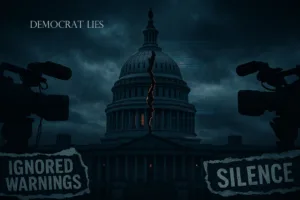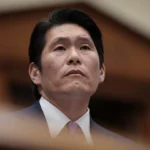⚡ Cutting through noise. Spotlighting the truth.
Biden Cognitive Decline Coverup Details Emerge

The Biden cognitive decline coverup isn’t just a fringe theory anymore. It’s now dissected in bestselling books, bipartisan interviews, and hours of taped testimony. New revelations confirm what millions suspected: top figures in Joe Biden’s inner circle worked quietly to limit public awareness of his cognitive decline, while many in the media looked the other way.
But this went beyond basic political shielding. According to insiders, it became a calculated strategy, an image-management campaign designed to hide a deeper truth.
Biden’s Schedule Was Engineered to Mask Decline
According to Original Sin by Jake Tapper and Alex Thompson, Biden’s handlers shaped nearly every aspect of his public life to minimize exposure. His schedule reportedly ran from 10 a.m. to 4 p.m., short hours by any standard, and events were strictly managed. Senior advisers Mike Donilon and Steve Ricchetti, along with First Lady Jill Biden, built what Tapper describes as a “protective politburo.”
Cognitive testing? Off the table. Aides feared the political fallout more than the results. Critics argue that amounted to deliberate disinformation, selling competence while burying signs of decline.
Not everyone inside agreed with that approach. Jake Sullivan, Biden’s national security adviser, rejected rumors that Biden forgot his own name, calling such claims “absurd.” A spokesperson added, “There was no instance where national security was compromised due to his condition.”
But that narrative clashed with what Americans saw on camera: confused speech, rambling, and long pauses. Journalist Frank Sesno framed the issue plainly: “What was missing was clear, vigilant, and tough questioning.” In other words, the press flinched.
Hur Interview Exposed Cognitive Struggles in Real Time
The interview also became a pivotal piece of the broader Biden cognitive decline coverup, offering tangible proof to what many suspected was being concealed.
In May 2025, Axios released a five-hour, unedited audio of Biden’s October 2023 interview with special counsel Robert Hur. Though intended to address Biden’s handling of classified documents, the conversation revealed something else entirely.
Biden struggled with basic recall, wandered mid-thought, and contradicted himself. Even routine questions proved difficult. It raised serious concerns: How was a man, described by insiders as “a shell of himself,” still leading the most powerful nation on earth?
While supporters insisted national security was never compromised, the need for aides to tightly control Biden’s environment only fueled suspicion. The earlier classified documents scandal had already prompted questions about judgment and responsibility. This interview added another layer.
Media Complicity: The Watchdogs Slept
The press, often hailed as democracy’s last defense, now faces hard questions. Sure, some reporters voiced concern about Biden’s condition. But those warnings were quiet, muted beneath partisan noise and media inertia. As one Los Angeles Times contributor noted, “Biden’s decline was reported. It just wasn’t amplified.” When Hunter Biden’s laptop dominated the news cycle, where was the same urgency for the cognitive health of the sitting president?
Critics argue fear shaped coverage; fear of aiding Republicans, fear of a Democratic succession crisis, fear of being labeled partisan. The result? Tepid investigations, no real accountability, and a missed opportunity to confront the issue early.
Even inside the party, the mood has shifted. In May 2025, Democratic Representative Ro Khanna said, “Democrats should be straight up that he should not have run. There should have been an open primary.” A blunt admission, but maybe too late.
Original Sin Reveals the Strategy Behind the Coverup
Among all the sources driving this reevaluation, Original Sin hits hardest. Jake Tapper, often seen as center-left, doesn’t just recount gaffes. He and co-author Alex Thompson expose the systemic shielding of a president who was slipping. They describe a presidency built on stagecraft, where every event was choreographed, every handshake practiced. Biden’s advisers avoided off-script moments, kept the press at arm’s length, and leaned heavily on teleprompters.
Instead of transparency, they relied on optics. According to the book, this wasn’t just about public image, it may have shaped policy. Were critical decisions delayed or filtered to avoid triggering confusion? If so, the American people deserved the truth.
Even so, the authors don’t paint Biden as malicious, just surrounded by loyalists in deep denial. But denial doesn’t erase the consequences.
The Debate Has Shifted from Whisper to Reckoning
The Biden cognitive decline coverup is no longer just political speculation. It’s a documented reality with implications that stretch from the Oval Office to the mainstream media’s credibility.
The conversation has changed. What was once dismissed as conspiracy is now backed by documentation and witness accounts.
- Advisers reportedly concealed cognitive decline by scripting appearances and dodging medical evaluations.
- The Hur interview reinforced public concerns about Biden’s recall and focus.
- The media’s muted response helped delay the reckoning.
- Books like Original Sin have forced a more honest national conversation.
Add to that a broader crisis of media credibility. The same press that amplifies every slip from the right stayed cautious here, until it couldn’t. The recent alarm over antisemitism double standards echoes the same theme: selective outrage, strategic silence.
Americans deserve better. When half the country saw this coming, why did Washington pretend not to?




